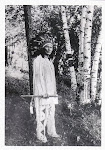"Being an Indian in the world is the loneliest kind of existence. At least, such is the case when one leaves behind the comfort and security of family and tribe for the wider world of modern societies..."
Thus begins Dr. David Martinez's study of the writings of Ohiyesa, Dr. Charles Alexander Eastman. I want to offer him public thanks for this insightful, serious exploration. It is the book that I, as an Eastman biographer not of Dakota or Native American origin, had been hoping for, an in-depth philosophical and literary investigation into the many themes woven into Eastman's writings.
The Eastman Martinez illuminates is the same one I had come to know through his writings and his life but one not often found in other commentary about him. Martinez does not dismiss Eastman's works as those of his wife, or as simplistic children's entertainment in the case of Indian Boyhood, or as assimilation rationalization, or as romanticized nostalgia or commercial ventures. Nor does Martinez deny that some aspects of these qualities creep in.
Instead Martinez honors the works as significant acts of reconnection and duty by Eastman to overcome that lonely alienation within the white world, bringing forth his Dakota heritage and that of other American Indians into the light of the larger culture to educate Americans and Native Americans; to preserve the values, skills, culture, stories, and history for generations to come; to inspire individuals and communities; and to establish the rightful place of American Indians as positive contributors to America's past and future. Martinez places Eastman in his rightful place as a historic American philosopher, worthy of greater attention and respect.
Through his book Dakota Philosopher, Martinez also integrates the history and writings of other significant Native Americans of Eastman's time and the Society of American Indians (SAI), connecting their issues to issues of contemporary Native Americans.
Dr. Martinez, though not of Dakota descent, is a Native American studies professor and scholar of Pima heritage and an enrolled member of the Gila River Indian Community. Thank you!
Subscribe to:
Post Comments (Atom)





No comments:
Post a Comment